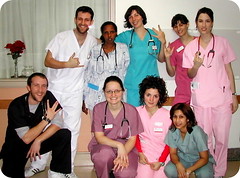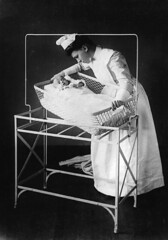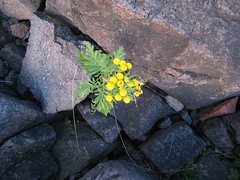This series on Kate Cumming is dedicated to all those nurses who give of themselves to heal others. Your kindness, your touch, your wisdom and your unselfish dedication can never be appreciated enough.
To all my sister and brother nurses,
Thank You.
An Exerpt from Kate's Diary:
April 12, 1861 -- I sat up all night, bathing the men's wounds, and giving them water. Every one attending to them seemed completely worn out. Some of the doctors told me that they had scarcely slept since the battle.
As far as I have seen, the surgeons are very kind to the wounded, and nurse as well as doctor them. The men are lying all over the house, on their blankets, just as they were brought from the battle-field. They are in the hall, on the gallery, and crowded into very small rooms. The foul air from this mass of human beings at first made me giddy and sick, but I soon got over it. We have to walk, and when we give the men any thing we kneel, in blood and water; but we think nothing of it at all.
There was much suffering among the patients last night; one old man groaned all the time. He was about sixty years of age, and had lost a leg. He lived near Corinth, and had come there the morning of the battle to see his two sons, who were in the army, and he could not resist shouldering his musket and going into the fight. I comforted him as well as I could. He is a religious man, and prayed nearly all night. Another, a very young man, was wounded in the leg and through the lungs, had a most excruciating cough, and seemed to suffer awfully.
One fine-looking man had a dreadful wound in the shoulder. Every time I bathed it he thanked me and seemed grateful. He died this morning before breakfast. Men who were in the room with him told me that he prayed all night. I trust that he is now at rest far from this dreary world of strife and bloodshed. I could fill whole pages with descriptions of the scenes before me.
This morning, when passing the front door, a man asked me if I had any thing to eat, which I could give to some men the depot awaiting transportation on the cars. He said that they had eaten nothing for some days. Some of the ladies assisting me, we took them hot coffee, bread and meat. The poor fellows ate eagerly, and seemed so thankful. One of the men, who was taking care of them, asked me where I was from. When I replied Mobile, he said that Mobile was the best place in the Confederacy. He was a member of the Twenty-first Alabama Regiment; I have forgotten his name. I have been busy all day, and can scarcely tell what I have been doing; I have not taken time to even eat, and certainly not time to sit down.
KC
~~~~
What was it that made Kate so willing to endure such personal hardship, so willing to witness such human suffering, so willing to care and give care with almost hopeless odds of success?
One could suppose that she hoped in doing so she was somehow helping her brother's cause, who had enlisted in the Confederate Army months before. But I doubt that was entirely it.
One could surmise that it was because she fiercely loved her country, her adopted land and wished to preserve the way of life she had come to know and love. I don't doubt that some of that is true, we know Kate strongly identified herself as a Southerner. But I suspect there was something else there as well.
It is as simple as this. In her very heart,
Kate was a nurse. A nurse has that deep within her which makes her truly,
a nurse. Her statement, ". . .when we give the men any thing we kneel, in blood and water; but we think nothing of it at all," this is the statement of a nurse. How many nurses among us know exactly what Kate means by this? That moment when, unexpectedly, blood is splattered or spewn, vomited or thrown, gushed or dripped, all over you and you just know you can't stop, you just have to go on thinking "nothing of it at all".
Kate was
a nurse, a dedicated, caring,
good nurse.
Kate was a prototype for every good nurse today and an example for everyone who hopes to one day be a nurse.

We had the great honor this past Sunday, of placing roses on Kate's grave. We found some beautiful white roses that were barely tipped with red along the edges. Looking at them, I couldn't help but think of what what a nurses' white pinafore would look like as she walked along bloody halls.
Placing the small bouquet at her tombstone seemed like such a small gesture, but it was a big thing in my heart. It was a way of connecting me, 150 years later, to this nurse who was willing to give up her every comfort in order to give what little comfort she could, to others.
To everyone who wears the title, NURSE;
to everyone who sacrifices their own comforts for the comforts of others, and to our friend Kate,
I applaud your dedication and your devotion.



















